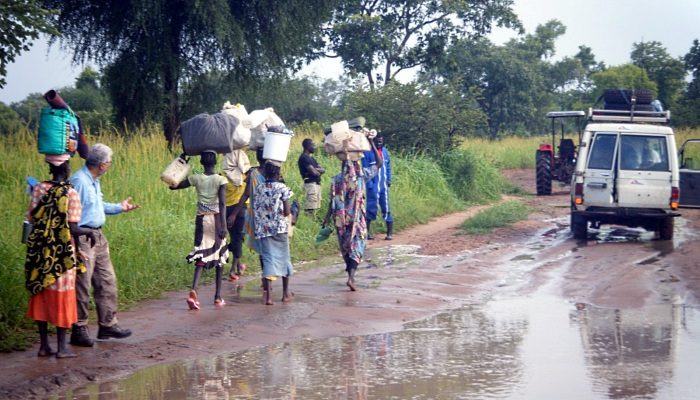
The people who suffer most are often the most generous. I experienced this as I sat in my Landcruiser marooned in the sea of mud on what passed as the main highway in the Nuba Mountains of Sudan. The tractor accompanying us – precisely for such eventuality – had itself broken down from the toil of dragging our car through mile after mile of some of the most difficult terrain in the world. Neither our radio nor the satellite phone could get through to our base camp asking for the second tractor to come out. We were in a communications black hole.
As the hours went by with dwindling prospects for rescue, a teenager passed by. With only a little persuasion, he agreed to walk three hours to our base to convey our plea for rescue.
Meanwhile, along came some good Samaritans: young women carrying gourds of sorghum beer and pancakes (kisra) with okra sauce. They were on their way to refresh their menfolk a few miles away. Those were soldiers of the Sudan Peoples Liberation Army – North. They were normally occupied against the oppressive Sudan Government Armed Forces that bombed and burnt their homeland, but were currently doing community service, helping local villagers to plant during the rainy season. The women noted my predicament and offered their food and drink.
Thus the spirit of the Nuba brought both rescue and comfort in my hour of greatest need.
How can so much kindness co-exist with so much cruelty? Only the previous day, Mawan Tutu had told me how she and her children were bombed by Antonov bombers of the Sudan Air Force three times in one day, initially as they rested at home, then at the nearby hospital where they rushed for treatment for shrapnel injuries, and finally at her father’s house where she had fled in desperation.
When I toured the same hospital – built by local people and supplied by MSF – I could see its bullet-pitted walls and crumbling crater holes. I learnt that it had been bombed twice before and, two days after my visit, it was bombed yet again. But it never stopped working. Farandala was the fourth medical facility bombed in the Nuba Mountains in 2014.
A couple of days earlier, Rashaida Kuku let me use my distinctly rusty medical skills to probe her burnt and twisted arm. Her house had exploded under yet another bombardment by the Khartoum regime. Amna, her pregnant neighbour, had miscarried and gone blind at the same time. Just from the extreme shock, I suspected, after examining her otherwise normal-looking eye. Her companion was twenty-year old Zeinab, disabled from childhood by polio. What kind of horror had compelled her to crawl on her hands and knees for ten days through the bush? Luckily she had managed to avoid the snakes and landmines before reaching the relative safety of Yida, just across the border into South Sudan.
But the refugees refused to remain as victims. They were determined to resist the horror and injustice being inflicted upon them and earn themselves the better destiny that was their human right. With no help from United Nations agencies who, in violation of the Refugee Convention, were shamelessly pressurising them to move somewhere more convenient as a condition for receiving assistance, they had set up ramshackle shelters, made tools from the remains of the artillery shells that had targeted them, begged and borrowed seeds, and were growing maize and groundnuts. Another refugee, Basima, had a bold proposition for me: she would give me a good deal – better than the World Food Programme – if I could buy her surplus food production for humanitarian agencies to give to those who could not grow their own food.
As I admired her boldness, I reflected on my first visit to the Nuba Mountains in 2003 during my time as the Head of the United Nations in Sudan. On that trip I had come to appreciate their rich diversity – indigenous Africans grouped into some fifty tribes and speaking as many languages. I felt that these ancient people were, in a real sense, a cradle of our common human civilisation.
I was forced to leave Sudan a year later in 2004, on speaking out publicly after witnessing the genocide in Darfur – the fuller story of which is told elsewhere. But here I was, a decade later, returning to witness similar genocidal violence, perpetrated by the same leaders, in another part of Sudan – the Nuba Mountains.
I mused morosely on our failures in Darfur in 2004 that had encouraged the perpetrators to continue and extend their war crimes. So, a decade later, Sudan was not just the location of the first genocide of the 21th century – it was also nurturing the longest running genocide in human history, much longer than the 100-days of Rwanda killings or even the 7 years of the Holocaust.
But as I sipped my sorghum beer a different thought struck me. The reason Sudan’s genocidal violence was still on-going was because their targeted victims were too stubborn to allow themselves to be crushed.
As the tractor finally arrived to pull us out of the mud, I felt strangely inspired. The military might of the genocidal regime of Sudan would not prevail as long as the women of Nuba have the generosity to share their last gourd of beer with a stranger in distress.
Further Reading on E-International Relations
- Self-Determination as a Process: The United Nations in South Sudan
- Opinion – The Sudanese Conflict and the Abyei Dispute
- Queering Genocide: How Can Sexuality Be Incorporated Into Analyses Of Genocide?
- Opinion – Academics Opening Their Hearts for Climate Actions
- The Rituals of a Massacre: Mapping Violence during the Rwandan Genocide
- Post-Genocide Rwanda’s Struggle to ‘Never Forget’ and Move On